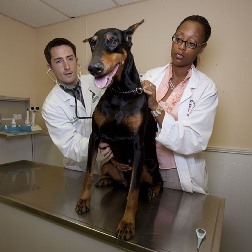How to Find the Right Vet Tech College in Arkansas
 Achieving your long term aspiration of working with and caring for animals by enrolling in a veterinary school in Arkansas could initially feel like a daunting task. After all, you must locate and enroll in a college that will furnish the necessary training so that you can be successful as a vet assistant, technician or technologist. But just how do you go about evaluating and contrasting schools so that you can make the best choice? Many future students launch their due diligence process by searching for campuses that are near their residences. Once they have found some area schools, they find out which ones have the lowest tuition and focus on those. Although cost and location are important factors when evaluating vet tech schools, they are not the only significant ones when making your assessments. Factors such as accreditation and internship programs need to be looked into also. The point is that there are questions you ought to be asking the veterinary tech programs you are looking at before you make a final selection. We have provided several in this article to help get you started, but before we discuss them we’ll go over the different duties of veterinary techs and assistants and the training alternatives offered.
Achieving your long term aspiration of working with and caring for animals by enrolling in a veterinary school in Arkansas could initially feel like a daunting task. After all, you must locate and enroll in a college that will furnish the necessary training so that you can be successful as a vet assistant, technician or technologist. But just how do you go about evaluating and contrasting schools so that you can make the best choice? Many future students launch their due diligence process by searching for campuses that are near their residences. Once they have found some area schools, they find out which ones have the lowest tuition and focus on those. Although cost and location are important factors when evaluating vet tech schools, they are not the only significant ones when making your assessments. Factors such as accreditation and internship programs need to be looked into also. The point is that there are questions you ought to be asking the veterinary tech programs you are looking at before you make a final selection. We have provided several in this article to help get you started, but before we discuss them we’ll go over the different duties of veterinary techs and assistants and the training alternatives offered.
The Job of a Vet Assistant and Tech
 One of the first decisions that you will have to make is whether you wish to train as a veterinary assistant, technician or technologist. Part of your decision might be predicated on the amount of time and money that you have to devote to your education, but the primary factor will probably be which specialty interests you the most. What vet techs and assistants have in common is that they all work under the direct direction of a practicing and licensed veterinarian. And while there are many tasks that they can perform within the Arkansas veterinary clinic or hospital, they can’t prescribe medications, diagnose ailments, or carry out surgeries. In those areas they can only furnish support to a licensed vet. There are technicians and technologists that work away from the conventional vet practice, for instance for animal shelters, zoos or police departments. Let’s take a look at the duties and education requirements for each specialization.
One of the first decisions that you will have to make is whether you wish to train as a veterinary assistant, technician or technologist. Part of your decision might be predicated on the amount of time and money that you have to devote to your education, but the primary factor will probably be which specialty interests you the most. What vet techs and assistants have in common is that they all work under the direct direction of a practicing and licensed veterinarian. And while there are many tasks that they can perform within the Arkansas veterinary clinic or hospital, they can’t prescribe medications, diagnose ailments, or carry out surgeries. In those areas they can only furnish support to a licensed vet. There are technicians and technologists that work away from the conventional vet practice, for instance for animal shelters, zoos or police departments. Let’s take a look at the duties and education requirements for each specialization.
- Vet Assistants in most instances will have gone through a structured training program, either as an intern or apprentice in a vet clinic or hospital, or by graduating from a certificate program at a community college or vocational school in Arkansas. As the name implies, their job function is to assist the vets and vet techs in the execution of their duties. Normally they are not associated with more involved tasks, for example assisting with surgical procedures. Some of their normal duties may include working at the front desk, cleaning and preparing examination rooms and equipment, or controlling pets during examinations.
- Vet Technicians go through more extensive training compared to assistants and usually earn a 2 year Associate Degree, ideally from an American Veterinary Medical Association (AVMA) accredited program. They are in a fashion the veterinary counterparts of medical nurses, since their fundamental job function is to assist veterinarians with diagnosing and treating animal patients. Where they vary from veterinary assistants is that they are involved in more complex functions, such as assisting with surgical procedures or administering medication. All states currently require vet techs pass a credentialing exam for either registration, certification or licensing.
- Vet Technologists are similar to vet techs and for the most part perform the same work functions. They are mandated to earn a Bachelor’s Degree in veterinary technology, which generally requires four years. Therefore the only real distinction between a vet technologist and a technician is the technologist’s more advanced level of education. But with an advanced degree comes more career options, higher salaries and potential management positions. They are also required to pass a credentialing examination for either licensing, registration or certification.
Veterinary techs and technologists can specialize in areas such as internal medicine, anesthesia or urgent care. Some may obtain certification from the American Association for Laboratory Animal Science (AALAS) to work in laboratories or Arkansas research facilities also.
Vet Online Programs
 An approach that might be a solution for those with a busy schedule or who are working full-time while going to veterinarian school is to enroll in an online training program. Since the classes are made available over the internet, students can study on their own timetable wherever a computer is accessible. The educational program is taught using various methods, including slide shows, videos and live streaming webinars. And since most vet technician and technologist degrees require clinical training, that part can normally be carried out as an internship or work study program at a local Arkansas veterinary clinic or hospital. Distance learning, as it is also called, may in many instances reduce the cost of your education. Tuition and ancillary costs, for example for travel and study supplies, may be lower compared to more traditional classroom programs. Just be sure that the program that you enroll in is accredited, either by the AVMA or another nationally certified accrediting organization. With the online classes and the clinical training, everything is provided for a comprehensive education. So if you are dedicated enough to learn in this more independent mode, an online veterinary technician or assistant school may be the perfect choice for you.
An approach that might be a solution for those with a busy schedule or who are working full-time while going to veterinarian school is to enroll in an online training program. Since the classes are made available over the internet, students can study on their own timetable wherever a computer is accessible. The educational program is taught using various methods, including slide shows, videos and live streaming webinars. And since most vet technician and technologist degrees require clinical training, that part can normally be carried out as an internship or work study program at a local Arkansas veterinary clinic or hospital. Distance learning, as it is also called, may in many instances reduce the cost of your education. Tuition and ancillary costs, for example for travel and study supplies, may be lower compared to more traditional classroom programs. Just be sure that the program that you enroll in is accredited, either by the AVMA or another nationally certified accrediting organization. With the online classes and the clinical training, everything is provided for a comprehensive education. So if you are dedicated enough to learn in this more independent mode, an online veterinary technician or assistant school may be the perfect choice for you.
Questions to Ask Veterinary Assistant and Technologist Degree Programs
 By now you probably have decided on which veterinarian certificate or degree that you want to obtain, and if you want to study online or attend a college on campus. Since there are a large number of veterinarian community colleges, trade and vocational schools in Arkansas and across the Country, you need to ask some relevant questions to help fine tune your list of options. As we pointed out in our opening, many prospective students start by focusing on location and tuition expense. But we have previously touched on other significant qualifiers, such as internship programs and accreditation. And obviously you need to choose a college that offers the specialty and degree that you want to earn. These and other qualifications are reviewed in the checklist of questions that you need to ask the veterinary assistant and technician schools that you are reveiwing.
By now you probably have decided on which veterinarian certificate or degree that you want to obtain, and if you want to study online or attend a college on campus. Since there are a large number of veterinarian community colleges, trade and vocational schools in Arkansas and across the Country, you need to ask some relevant questions to help fine tune your list of options. As we pointed out in our opening, many prospective students start by focusing on location and tuition expense. But we have previously touched on other significant qualifiers, such as internship programs and accreditation. And obviously you need to choose a college that offers the specialty and degree that you want to earn. These and other qualifications are reviewed in the checklist of questions that you need to ask the veterinary assistant and technician schools that you are reveiwing.
Is the Veterinary School Accredited? It’s important that you verify that the vet assistant or tech school you enroll in is accredited by a regional or national accrediting organization. As previously discussed, among the most highly regarded is the American Veterinary Medical Association (AVMA). Trade schools and colleges that are accredited by the AVMA have undergone a rigorous screening process that confirms you will obtain a superior education. Also, accreditation is important if you are applying for a student loan or financial assistance, since numerous programs are not obtainable for non-accredited colleges. Last, having a degree or certificate from an accredited program is in many cases a precondition for employment for a number of Arkansas vet practices and hospitals.
What is the College’s Reputation? The vet vocational school or college and program you enroll in must have an exceptional reputation within the veterinarian community. You can initiate your due diligence by asking the colleges you are interested in for testimonials from the employers in their job assistance network. Other suggestions include checking with internet school ranking websites and checking with the school’s accrediting organizations as well. You can ask the Arkansas school licensing department if there have been any complaints or infractions relating to your targeted schools. As a final pointer, contact some veterinarians that you may wish to work for after you receive your training. Ask what they think of your school selections. They may even recommend some schools not on your list.
Are Internships Offered? The most effective way to get practical hands on training as a vet assistant or technician is to work in a clinical environment. Find out if the colleges you are looking at have internship programs set up with area veterinarians, vet hospitals or clinics. The majority of veterinary medicine programs mandate clinical training and many provide it by means of internships. Not only will the experience be invaluable regarding the practical training, but an internship can also help establish associations in the local Arkansas vet community and help in the search for a job after graduation.
Is there a Job Placement Program? Finding a job after graduating from a veterinary tech or assistant college can be challenging without the help of a job placement program. To start with, ask what the graduation rates are for the programs you are reviewing. A lower rate may suggest that the instructors were ineffective at teaching the curriculum or that a number of students were dissatisfied with the program and quit. Next, confirm that the colleges have a job assistance program and ask what their placement rates are. A higher placement rate may indicate that the Arkansas program has an outstanding reputation within the vet community and has a substantial network of contacts for student placements. A lower rate might mean that the training is not well thought of by employers or that the job assistance program is ineffective at placing students.
How Large are the Classes? If the classes are larger in size, you most likely will receive little or no one-on-one instruction from the teachers. Find out from the Arkansas colleges you are considering what their classroom teacher to student ratios are. You may also decide to sit in on a couple of classes (if practical) to observe the interaction between students and teachers. Ask for evaluations from students concerning the quality of instruction. Also, speak with the teachers and determine what their qualifications are as well as their methods of teaching.
Where is the College Located? Yes, we previously discussed location, but there are a couple of more points to consider on the subject. If you are planning to drive to your veterinary tech classes from work or home, you have to make sure that the driving time fits into your schedule. For instance, driving during the weekend to check out the route won’t be the same as the drive during rush hour traffic, particularly if the Arkansas college is located near or in a large city. Also, if you do choose to enroll in a school in another state or even outside of your County of residence, there may be increased tuition costs especially for community and state colleges. Of course taking online classes may be an alternative that will give you more flexibility and minimize the necessity for travel.
Is the Class Schedule Flexible? And finally, it’s important that you find out if the Arkansas veterinary programs you are evaluating offer class times flexible enough to fit your schedule. For instance, many students continue to work full time and can only attend classes on the weekends or in the evenings. Some might only be able to go to class in the morning or later in the afternoon. Confirm that the class times you require are available before enrolling. Also, find out if you can make up classes that you may miss because of sickness, work or family emergencies. You might find that an online college is the ideal way to fit your veterinary education into your hectic life.
Pick the Ideal Veterinary Technician Degree Program in Arkansas
Enrolling in the appropriate vet assistant or tech college is a crucial first step to starting a fulfilling career delivering care and treatment for pets and livestock. Students considering vet tech or assistant schools need to make their selection based on several key factors. Vet assistants, techs and technologists are employed in vet clinics, animal hospitals and animal shelters. They usually handle administrative tasks and assist the veterinarian with the animals when needed. As we have discussed, it’s very important that you choose a veterinary medicine program that is both accredited and has an outstanding reputation within the profession. This goes for vet tech online schools as well. By asking the questions included in our checklist for assessing schools, you will be able to narrow down your alternatives so that you can make your final choice. And by picking the ideal school, you can reach your goal of becoming a vet technician, assistant or technologist.
